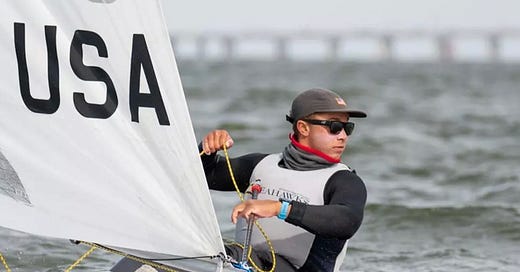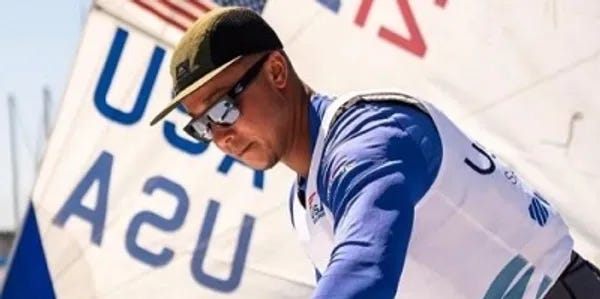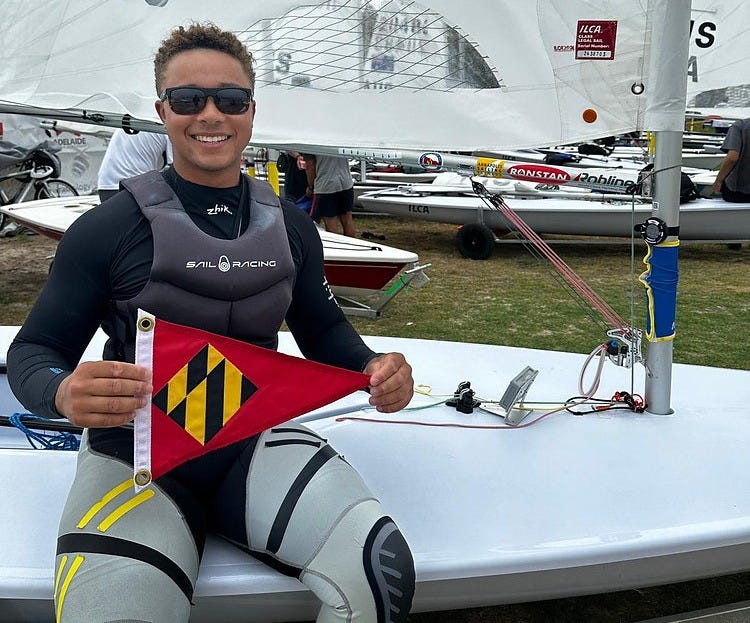Interview with Leo Boucher: A Rising Star in The Olympic ILCA 7 Class
Welcome to my interview with Leo Boucher, an ILCA 7 sailor with his sights set on competing at the 2028 Olympic Games in Los Angeles.
From his humble beginnings on the waters of Chesapeake Bay to representing the United States on the international stage, Leo’s journey is a testament to passion, perseverance, and grit.
Leo’s story follows a familiar trajectory for many U.S. sailors—breaking out of local competition to pursue success at the international level, all the while balancing between academics and competitive sailing, with the ultimate goal of representing the USA at the Olympics. His introduction to sailing came when his parents enrolled him and his sister in a summer camp at West River Sailing Club. A turning point came when Leo attended a talk by Terry Hutchinson, a celebrated multiple world champion, and America’s Cup sailor and a local legend in Annapolis. Inspired by Hutchinson’s words, Leo decided to explore racing—and it wasn’t long before his natural talent and passion for the sport began to shine.
Breaking out of the typical mold, Leo’s family did not come from a sailing background nor were they members of a yacht club. Instead, he grew up in a mixed-race family that valued time on the water but had little connection to the traditional pathways often associated with the sport. His journey has been shaped by the unwavering support of his family and exposure to the Annapolis sailing community, enabling him to navigate and excel in a space where diversity remains limited.
As he prepares for the LA28 Olympics, I have the opportunity to delve into his experiences, challenges, and aspirations. Today, we'll explore his approach to training and competition, and the support systems that have shaped his journey.
First Recipient of the 2021 U.S. Sailing Kevin Burnham Memorial Award
Two-time North American ILCA Champion 2021-2022
Two-time ISCA Singlehanded National Champion 2019, 2021
First Place Crew Congressional Cup 2021
First Place Orange Bowl Youth Regatta ILCA 6 and ILCA 7 - 2015, 2016, 2017
Interview with Leo Boucher: A Rising Star in The Olympic ILCA 7 Class
Q: Let’s start with a big question. Do you have one memorable experience that stands out in your sailing journey?
Leo: One that comes to mind is the North Americans in San Francisco. That event was amazing—I ended up winning it. It was windy, and I felt like the underdog then because I was smaller and not necessarily built for a breezy venue like San Francisco Bay. But, this event ended up being a big breakthrough for me. It was the first regatta I won that qualified me for an international event—a spot in the Junior Pan American Games in Calima Lake, Colombia.
That regatta was a huge standout moment for me. It gave me something bigger to aim for and motivated me to keep pushing forward. It wasn’t just about winning; it was about opening the door to the next stage in my sailing career.
Early Beginnings and Family Influence
Q: Let’s jump into your background. Tell me about your family and how you got into sailing.
Leo: I grew up in West River, Maryland, just south of Annapolis. My family was not a sailing family per se, but they loved being on the water. We had a powerboat and spent a lot of time cruising on Chesapeake Bay. One summer, when I was about seven or eight, my parents enrolled my sister and me in a sailing camp.
My sister, Pilar, enjoyed it but leaned more toward the fun, casual side of sailing. I, on the other hand, was drawn to the competitive side. I started in Optis and eventually moved into ILCA 6. By age 13 or 14, I began training more seriously. I joined the Severn Sailing Association in Annapolis. From there, things really took off.
Q: Tell me more about your sister. Did she pursue competitive sailing?
Leo: Pilar’s two years older than me, and she has always been into music. She has a master’s degree in music performance from Carnegie Mellon and recently started working at the Eastman School of Music in Rochester, New York. Eastman Conservatory is part of the University of Rochester. Pilar is in charge of some of their summer program activities. She lives there with her boyfriend, who’s a teacher.
Q: You mentioned your dad and his interest in music. How about your mom?
Leo: My dad was a high school music teacher for 30 years, and my sister has followed in his footsteps in the music education world. My mom, Brenda Boucher, works in Washington, DC.
Q: What values did your parents instill in you that have shaped your success as a sailor?
Leo: Work ethic, for sure. They encouraged me to put in the effort, even when things weren’t fun. I remember frostbiting in Annapolis when it was snowing—it was miserable, but my parents were like, “You should do it. It’s good training.” In high school, I woke up at 5 a.m. twice a week to work with a personal trainer before school. Looking back, that work ethic has carried me through the ups and downs of my sailing career.
Sailing Beginnings: From Optis to Radials
Q: How did your transition from Optis to Lasers happen?
Leo: After two summers of sailing in a local program at West River, I started racing in the Opti Green Fleet and eventually moved into the white, blue, and red fleet. Around age nine, I began year-round sailing with the Severn Sailing Association in Annapolis. I moved into the ILCA 6 when I was about 13 or 14.
I trained a lot with Clay Johnson, Kyle Rogachenko, and Connor Blouin. Connor was a significant part of my development as a Laser sailor, particularly during the 2015 Orange Bowl. His insights and experience helped shape my early success in the class.
I had some success in the ILCA 6, winning the Orange Bowl and finishing second at two Youth Worlds qualifiers (which sucked). When I turned 18, I transitioned into the ILCA 7. It was a tough move—I probably wasn’t ready physically—but staying in the ILCA 6 class didn’t make sense anymore, wanting to compete against sailors in the Men‘s ILCA 7 class.
Q: What were some standout moments in the ILCA 6?
Leo: Winning the Orange Bowl was a highlight. It was a big regatta, and I think I won seven of the 11 races, another, was making Gold Fleet at the Youth Worlds in Canada—it was my first big international event, and I held my own against some tough competition.
College Sailing: Balancing Academics and Competition
Q: You sailed in college at St. Mary’s College of Maryland. Was being on the sailing team part of your decision to go there?
Leo: It was definitely a factor, but honestly, the main reason was price. St. Mary’s is an in-state school, and with financial aid, it costs about $4,000 a semester. That was hard to beat, especially since I knew I could really contribute to the sailing program there.
I believe that your college experience is what you make of it. You can excel academically anywhere if you put in the work, and St. Mary’s gave me that opportunity without the massive debt of more expensive schools. Plus, it had a great sailing team, and I already knew some of the sailors through Laser sailing, so it felt like a good fit.
Q: How was your experience on the team? Did you start strong, or did you have to work your way up?
Leo: My freshman fall was a bit of a transition. I was the third driver at the time, which was tough because I wasn’t racing as much as I wanted. But by spring, I moved up to the second driver spot and sailed regularly in regattas. That spring, I finished second in B Division at Nationals as a freshman, which was a big confidence booster.
By my sophomore year, I was sailing in A Division and stayed there for the rest of my college career. We had ups and downs as a team, but overall, it was a great experience. My senior year was especially strong—we were ranked in the top three for fleet racing and the top four for team racing nationally. I was named an All-American, and two of our crews also earned All-American honors.
St. Mary’s was an incredible experience. With the guidance of Bill Ward, I achieved a historic milestone by winning St. Mary’s first-ever Singlehanded National Championship in the ILCA classs. Later, Mr. Ward continued to support me by coaching me during the US Olympic Trials in February 2023, a pivotal moment in my campaign.
Q: What was it like balancing academics with college sailing?
Leo: It was definitely a challenge at first. I started as a physics major, which required a ton of labs and math courses. That made balancing sailing and academics difficult, so I eventually switched to economics and French, with a minor in business administration.
By my junior and senior years, I had found a better balance. I learned to manage my time effectively and focus on what mattered. Looking back, the combination of academics, college sailing, and ILCA training prepared me for the discipline required in an Olympic campaign.
Coaching: Passing on the Knowledge
Q: You’re coaching now as part of funding your campaign. How did you get into coaching?
Leo: Coaching was a natural progression for me. I’ve always enjoyed helping others improve, and it’s a great way to stay connected to the sport while funding my sailing.
Right now, I work with a mix of private clients and teams. I’m assistant coaching the Yale sailing team part-time, which has been a fantastic experience. They’re a talented group, and it’s rewarding to help them refine their skills and strategy. I also coach individual sailors, primarily in the ILCA class, focusing on technique, fitness, and race strategy.
Q: What do you focus on as a coach?
Leo: It depends on the sailor, but a big part of my coaching is helping them develop a deeper understanding of tactics and decision-making. Boat speed and fitness are critical, of course, but knowing how to position yourself on the course and anticipate shifts separates good sailors from great ones.
I also focus on mental toughness. Sailing can be incredibly frustrating, especially when things don’t go your way. I try to help my sailors stay composed, learn from mistakes, and bounce back stronger.
Q: You also mentioned working with youth teams and U21 groups. Can you share more about that?
Leo: Yes, I’ve recently started working with the U21 ILCA team at Alamitos Bay Yacht Club in California. I’m essentially a sparring partner for the sailors—I train alongside them, act as a pace boat, and provide feedback on their performance. It’s a unique setup because I’m both coaching and training simultaneously.
I think this hands-on approach is really effective. It allows me to push the sailors while also refining my own skills and having a coach in the boat with them gives them immediate feedback they can apply immediately.
Q: How does coaching fit into your long-term goals?
Leo: Coaching not only helps fund my campaign, but it also makes me a better sailor. Teaching forces you to articulate concepts clearly and think critically about the sport. It’s also great to give back and help develop the next generation of sailors. In the long term, I could see myself continuing to coach even after my Olympic sailing career ends.
The Olympic Journey: Challenges and Lessons
Q: What inspired you to pursue an Olympic campaign?
Leo: It wasn’t something I grew up dreaming about. The idea started taking shape during college, but it wasn’t until COVID hit that I got serious about it. With everything shut down, all I did was sail, and I realized I wanted to give it a real shot.
I wouldn’t call my first attempt a full Olympic campaign—it was about eight months of focused sailing leading up to the Paris trials. It gave me a taste of what it takes, but I learned that to be truly competitive, I’d need a more structured plan, better training partners, and more time in Europe.
Q: What were some key takeaways from the trials?
Leo: One big lesson was the importance of spending more time in Europe. The fleet dynamics and level of competition there are entirely different from what you get in the U.S. In hindsight, I should have done more European events to prepare. That’s something I’m planning to change this time around.
Another takeaway was the need for more dynamic training partners. I trained with only two or three other boats for most of the last campaign. While helpful, it didn’t push me in the same way a larger, more competitive training group would have.
Lastly, the trials reinforced the importance of mental resilience. It’s easy to get caught up in the pressure and start second-guessing yourself, but I’ve learned that staying calm and focused is critical, especially in a high-stakes environment like the trials.
Q: How has that experience shaped your current approach to LA 2028?
Leo: It’s given me a clearer picture of what I must do. This time, I’m focusing on building a stronger foundation—physically, mentally, and strategically. I also prioritize connections with international sailors and training groups to ensure I’m racing at the highest level possible.
The Paris trials were humbling, but they showed me I could compete at that level. It’s about refining the details and putting in the work over the next few years.
Q: What’s different about your approach this time for LA 2028?
Leo: This cycle is all about building a solid foundation. I’m focusing on fitness, improving my starting and upwind boat speed, and getting as much high-level racing experience as possible. Funding and finding the right training partners are challenges, but I’m working on building connections in Europe and maximizing opportunities here in the U.S.
Funding and Balancing the Campaign
Q: How are you funding your campaign?
Leo: Right now, the Annapolis Yacht Club Foundation, Fleming Yachts, Annapolis Sailing Fitness, and US1 Design support me. I also coach sailing and recently started a small business chartering coach boats, which helps cover the costs of domestic events.
Q: Tell me more about the coach boat business. How did that come about?
Leo: It started as a side project. I bought two used ribs that needed a lot of work—one had a motor that hadn’t run in years, and neither could hold air. I refurbished them, added features like phone chargers and storage, and now rent them out at regattas.
The goal is to make enough from charters to cover my initial investment, but the cash flow from the rentals also helps fund my sailing. It’s been a fun project that combines my business minor with my passion for sailing.
Reflections and Advice
Q: You’ve faced your share of setbacks. What have those taught you?
Leo: A big lesson is resilience. International events can be humbling—you go from winning in the U.S. to racing against fleets where everyone’s as good as you, if not better. Early on, I’d get nervous and overthink things. Now, I try to approach each event as a learning opportunity.
Q: What advice would you give to young sailors dreaming of the Olympics?
Leo: Take your time to build a strong foundation. Work on fitness and race as much as you can, and don’t be afraid to fail—that’s where real learning happens. And surround yourself with people who push you to be better.
Q: What’s your ultimate goal?
Leo: The long-term goal is to qualify for the 2028 Olympics in LA. But along the way, I want to keep improving, represent the U.S. at the highest level, and inspire the next generation of sailors to aim high.
Final Thoughts
Leo’s journey is a testament to hard work, resourcefulness, and passion for the sport. As he navigates the challenges of an Olympic campaign, his story inspires sailors and athletes striving to balance ambition with the realities of funding and logistics.
To learn more about Leo and support his 2028 Olympic campaign, visit his official website: https://lwbsailing.com/





